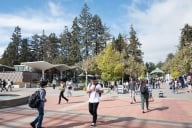You have /5 articles left.
Sign up for a free account or log in.
"I know my time is short," G. tells me, "and I want to pack as much thinking as possible into what’s left."
It's the last night of class in the last course these students can take with me. A mix of nostalgia, excitement and exhaustion is in the air. We are saying goodbye with presentations and food, quick hugs and promises to keep in touch. Against all odds (some acknowledge with stunned expressions), this class has not been a mere deposit in the bank vault of education. We have changed each other.
G. is not dying, just graduating. But tonight feels like the death of ideas. All our fellow thinkers and talkers and dreamers are walking out the door. There’s no structure left to reel them back tomorrow, next week, next year. Our community has dispersed (something we’ve talked about this semester — the virtual nature of community) and the finale, as always, has a melancholy feel.
For the past several weeks, we have collaborated to create what Hemingway might call a "clean, well-lighted place" to question our own practices. Now, the lights are going out throughout the building and, in many ways, throughout the world. Slashed budgets, job cuts, strange politics, war, discrimination, willful misunderstanding, despair. And here we sit, asking, "How is identity formed? What is the nature of community? Who is the oft-cited 'they'?"
After 16 weeks of intellectual abandon, G. and I both know that the space to come and talk about these things is narrowing to a pinpoint of light.
And so he stays to talk after everyone has left, a habit we’ve fallen into these past few months, unusual tonight only because it’s the time most of us — students as well as teachers — are coiled tight and ready to bolt at the precise moment when break begins. It's the latest in a series of late-night concept pitches and strategy sessions about how he can articulate his thoughts without stifling them.
Much later, as I’m driving home, I will think of all the things, trite and otherwise, I should have said. This is not the end; it's a transition. You can never really lose a mind. The universe would not be so cruel to limit thought to a mere 16 weeks. You are leaving the institutionalization of critical thought. Now, you will have to create your own clean, well-lighted place in the face of what can seem like a very dark world. From here on, you have to make it happen.
But for now, we talk as if G.'s interpretation is truly our plight, the only reasonable conclusion given our experience. We discuss biology and culture and personal choice, wrong-headed policies, the future of education, his envisioned place in the corporate world. We make cross-generational references to popular films. We finish each other’s sentences.
"The really exciting thing about J.’s work is—"
"--everything we’ve been talking about is only 5 percent of the potentiality--"
"--even if the theory is ultimately proven false—"
"—it opens up so much—"
Which, we agree, is both terrifying and exhilarating.
G. thinks at warp speed, a far greater velocity than the everyday world requires or supports. A simple assignment turns into a 50-page thesis. Every sentence that comes out of his mouth or pen has several disclaimers, qualifiers, and alternate interpretations lurking behind it. If he tries to follow our mandates to "focus" and “frame,” his work becomes a strangely truncated outline with key connections missing. When everything seems important, editing is an arbitrary act. What to cut? How to choose? In a world full of meaning, which vital thing will you omit?
He's been medicated, counseled, mentored, and rewarded for this. But he remains the passionate explorer. Once an idea grabs him, he can’t seem to edit out intersecting issues. He experiences everything at once. Nothing is backdrop; it’s all center stage. He wants to explain totality. Anything less is a cheat.
"You’ve got to go to grad school," I tell him. We laugh.
We are suddenly aware of a peculiar silence. The building has taken on that hushed waiting that all public spaces get after hours. We can hear little pings and creaks in the walls and air ducts all around us, no longer masked by the rush of humanity through the rooms and halls. It’s long after 10:00 p.m. The security guard rattles the main doors, checks the side entrance. We are about to be "secured," and we decide that we don’t want to be the ones to discover whether exiting after lockdown sets off the alarms.
Backpacks and briefcases gathered, keys jangling as I shut down the computer and enter the security code, we walk, still talking, through the halls and out into the deserted parking lot. My cheap, reliable car sits not far away, in a little pool of streetlight, and we head toward it. As I unlock my door, I glance around the empty lot.
"Where’d you park?" I say, expecting to see his car lurking in the shadows nearby.
He flings one hand toward the deep-dark at the far end of the lot. "Back over there," he says. "I just didn’t want you walking out here alone."
I pause, keys in hand. It’s a courtly gesture, an everyday kindness. But tonight, it feels a lot like hope. I stand here, five thoughts warring at once in my head, each jamming the others so that not a one gets spoken. Because it strikes me just then that we create these clean, well-lighted places for each other. Hope flows both ways. It flows both ways. We conjure these temporary, malleable, and, most importantly, collaborative spaces for, and with, each other. We build them, not as escapes from a world gone unaccountably off track, but as paths through it. And from here on, we’ll have to make that happen. The scaffold is falling away.
"You have my e-mail," I say finally. "Use it." G. gives me a quick smile and saunters off, leaving me in a pool of light.








